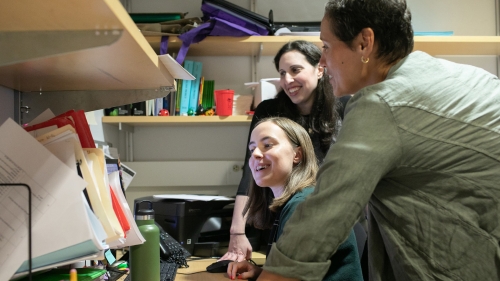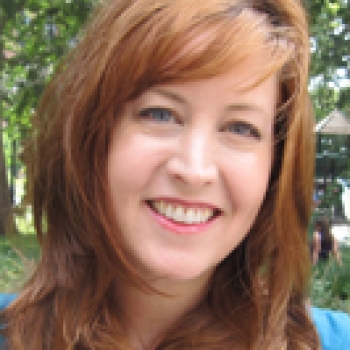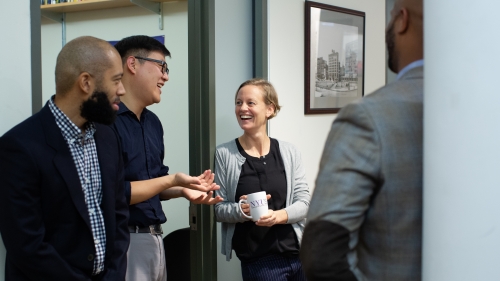

Erin Godfrey
Director of NYU's Institute of Human Development and Social Change and Associate Professor of Applied Psychology
Applied Psychology
The Institute of Human Development and Social Change
Dr. Erin Godfrey directs NYU's Institute of Human Development and Social Change. She is an associate professor of Applied Psychology in the Psychology and Social Intervention program in the Steinhardt School of Culture, Development, and Education. She received her BA in Psychology and Policy from Oberlin College and her PhD in Community and Developmental Psychology from New York University’s Graduate School of Arts and Sciences. Prior to beginning her doctoral studies, she conducted policy research at The Urban Institute in Washington, DC.
In her program of research, Dr. Godfrey examines how people understand, justify, or reject systems of oppression and marginalization. Her scholarship integrates theoretical perspectives and empirical research from developmental, community and social psychology to understand and change:
- the processes and contexts that underlie people's understanding of and responses to systemic oppression and social inequity,
- the psychological and social consequences of these responses, and
- the ways in which systemic oppression is enacted, or can be disrupted, in critical settings and contexts, such as education and juvenile legal systems.
She examines how these issues play out in a wide variety of settings, including classrooms, out-of-school and community-based programs, welfare and anti-poverty settings, juvenile justice systems, and neighborhoods. She also takes an intersectional lens in her approach to these questions, examining how multiple forms of power, privilege and marginalization intersect to inform people’s responses to and enactment or disruption of inequity, and shape their development and well-being.
Dr. Godfrey’s research has been supported by the multiple federal agencies and foundations, published in top-tier journals in multiple fields and subfields and featured in popular news media outlets such as The Atlantic.
Selected Publications
Singh, S., Berezin, M. N., Wallach, L. N., Godfrey, E. B. & Javdani, S. (in press). Traumatic incidents and experiences of racism and sexism: Examining associations with components of critical consciousness for system-involved girls of color. American Journal of Community Psychology.
Freel, S. H., Bilali, R., & Godfrey, E. B. (in press). We are the ‘Resistance’: Predictors and consequences of self-categorization into the emerging movement to oppose Trump. Group Processes and Intergroup Relations.
Burson, E. & Godfrey, E. B. (in press). Intraminority solidarity: The role of critical consciousness. European Journal of Social Psychology.
Hagelskamp, C, Silliman, R., Godfrey, E. B, & Schleifer, D. (2020). Participatory budgeting in New York City is associated with increased investments in schools, street and traffic improvements, and public housing. New Political Science, 42 (2), 171-196.
Poteat, V. P., Godfrey, E. B., Calzo, J. P. & Brion-Meisel, G. (2020). Increasing youth advocacy and sociopolitical efficacy: Promoting critical consciousness within gender-sexuality alliances. Developmental Psychology, 56 (6), 1207-1219.
Bilali, R., Godfrey, E. B., & Freel, S. H. (2020). How an election loss leads to a social movement: A longitudinal study of collective action in the aftermath of the 2016 U.S. presidential election. British Journal of Social Psychology, 59, 227-247.
Cappella, E., Godfrey, E. B. (author order alphabetical, 2019). New perspectives on the child‐ and youth‐serving workforce in low‐resource communities: Fostering best practices and professional development. American Journal of Community Psychology, 63, 245-252.
Sichel, C. E., Burson, E., Javdani, S. & Godfrey, E. B. (2019). Theorizing safety informed settings: Supporting staff at youth residential facilities. American Journal of Community Psychology, 63, 405-417.
Godfrey, E. B., Burson, E. & Yanisch. T. (2019). A bitter pill to swallow? Patterns of critical consciousness and socioemotional and academic well-being in early adolescence. Developmental Psychology, 55 (3), 525-537.
Burson, E., Godfrey, E. B., & Singh, S. (2019). “This is probably the reason why she resorted to that kind of action”: A qualitative analysis of juvenile justice workers attributions for girls’ offending. Journal of Prevention & Intervention in the Community, 47(2), 154-170.
Godfrey, E. B., Santos, C. E., & Burson, E. (2019). For better or for worse? System-justifying beliefs predict marginalized youth's developmental trajectories across early adolescence. Child Development, 90, 1, 180-195.
Godfrey, E. B. & Burson, E. (2018). Interrogating the intersections: How intersectional perspectives can inform developmental research on critical consciousness. In C. E. Santos & R. B. Toomey (Eds.), Envisioning the Integration of an Intersectional Lens in Developmental Science. New Directions for Child and Adolescent Development, 161, 17–38.
Burson, E. & Godfrey, E. B. (2018). The state of the union: Contemporary interminority attitudes in the United States. Basic and Applied Social Psychology, 40(6), 396-413.
Godfrey, E. B., & Cherng, H.Y. (2016). The kids are all right? Income inequality and civic engagement among our nation’s youth. Journal of Youth and Adolescence, 45, 11, 2218-2232.
Roy, A. L., Godfrey, E.B. & Rarick, J.R.D. (2016). Do we know where we stand? Neighborhood relative income, subjective social status and health. American Journal of Community Psychology, 57, 3-4, 448-458.
Roy, A. L. & Godfrey, E. B. (2016). Relationships between family and neighborhood income and first-generation Latino adults’ depressive symptoms and well-being. Journal of Community Psychology, 44, 7, 856-871.
Godfrey, E. B. & Wolf, S. (2016). Developing critical consciousness or justifying the system? A qualitative analysis of attributions for poverty and wealth among low-income racial/ethnic minority and immigrant women. Cultural Diversity & Ethnic Minority Psychology, 22, 1, 93-103.
Wray-Lake, L., Rote, W., Gupta, T., Godfrey, E. B. & Sirin, S. (2015). Examining correlates of civic engagement among immigrant adolescents in the United States. Research in Human Development, 12, 1-2, 10-27.
Godfrey, E. B., & Grayman, J. K. (2014). Teaching citizens: The role of open classroom climate in fostering critical consciousness among youth. Journal of Youth and Adolescence, 43, 11, 1801-1817.
Grayman, J. K., & Godfrey, E. B. (2013). Social justice attitudes and their demographic correlates among a nationally representative sample of US adolescents. Social Justice Research, 26, 4, 422-444.
Godfrey, E. B. (2013). System justification, mental health and behavior among disadvantaged mothers and their children. Basic and Applied Social Psychology, 35, 4, 382-395.
Godfrey, E. B. & Yoshikawa, H. (2012). Caseworker-recipient interaction: Welfare office differences, economic trajectories and child outcomes. Child Development, 83, 1, 382-398.
Godfrey, E.B., Osher, D., Williams, L., Wolf, S. Berg, J., Torrente, C. et al. (2012). Cross-national measurement of school learning environments: Creating indicators for evaluating UNICEF’s Child Friendly Schools Initiative. Children and Youth Services Review, 34, 3, 546-557.
Gassman-Pines, A., Godfrey, E. B., & Yoshikawa, H. (2012). Maternal education preferences moderate the effects of mandatory employment and education programs on child positive and problem behaviors. Child Development, 84, 1, 198-208.
Ng, F., Tamis-LeMonda, C., Hunter, C., Godfrey, E. B. & Yoshikawa, E. B. (2012). Dynamics of mothers’ goals for children in ethnically diverse populations across the first three years of life. Social Development, 21, 4, 821-848.
Yoshikawa, H., Gassman-Pines, A., Morris, P. A., Gennetian, L. A., & Godfrey, E. B. (2010). Racial/ethnic differences in effects of welfare policies on school readiness and later school achievement. Applied Developmental Science, 14, 3, 137-153.
Yoshikawa, H., Godfrey, E. B., & Rivera, A. (2008). Access to institutional resources as a measure of social exclusion: Relations with family process and cognitive development in the context of immigration. New Directions in Child and Adolescent Development, 121, 63-86.
Ross, S. L., Turner, M. A., Godfrey, E. B. & Smith, R. R. (2008). Mortgage lending in Chicago and Los Angeles: A paired-testing study of the pre-application process. Journal of Urban Economics, 63, 902-919.
Galster, G. C., & Godfrey, E. B. (2005). By words and deeds: Racial steering by real estate agents in the U.S. in 2000. Journal of the American Planning Association, 71, 3, 251-265.


